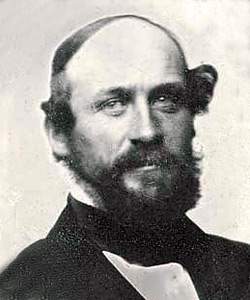Charles Robinson (American National Biography)
Scholarship
[Charles] Robinson became a key figure during the violence known as "Bleeding Kansas." Leader of a free-soil faction that considered blacks as potential equals, he opposed accepting the results of the fraudulent election of a proslavery legislature. During the statehood controversy and thereafter he faced a rival in James H. Lane (1814-1866), a political opportunist who favored excluding blacks from the territory. Concerned about the emigrant aid company's investment as well as his own land speculation and the free-state cause, Robinson in 1855 urged Thayer to send Sharps rifles to Kansas. He took part in the faction-torn conventions at Big Springs, which formed a Free State party favored by Lane, and at Topeka, which drafted a free-state constitution, favored by Robinson, that proposed a referendum on excluding blacks, favored by Lane and opposed by Robinson.
When violence flared in the so-called Wakarusa Warbetween proslavery and free-state elements, Robinson took a hand in avoiding bloodshed that enhanced his reputation among moderate free-state groups. Early in 1856, in a contest against Lane, he was elected governor under the Topeka constitution adopted by free-state voters. He now headed a rump government that became the storm center of presidential politics in 1856...
The Free State party in Kansas yielded to the Republican party and the Topeka constitution to the freshly drafted Wyandotte constitution. In 1861, with the admission of Kansas, Robinson became the state's first governor. He faced the demands not only of organizing a new state but also of meeting Washington's war needs.
When violence flared in the so-called Wakarusa Warbetween proslavery and free-state elements, Robinson took a hand in avoiding bloodshed that enhanced his reputation among moderate free-state groups. Early in 1856, in a contest against Lane, he was elected governor under the Topeka constitution adopted by free-state voters. He now headed a rump government that became the storm center of presidential politics in 1856...
The Free State party in Kansas yielded to the Republican party and the Topeka constitution to the freshly drafted Wyandotte constitution. In 1861, with the admission of Kansas, Robinson became the state's first governor. He faced the demands not only of organizing a new state but also of meeting Washington's war needs.
James A. Rawley, "Robinson, Charles," American National Biography Online, February 2000, http://www.anb.org/articles/04/04-00859.html.




